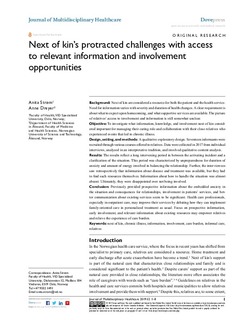| dc.description.abstract | Background: Next of kin are considered a resource for both the patient and the health service. Need for information varies with severity and duration of health changes. A clear requirement is about what to expect upon homecoming, and what supportive services are available. The picture of relatives’ access to involvement and information is still somewhat unclear.
Objective: To investigate what information, knowledge, and involvement next of kin considered important for managing their caring role and collaboration with their close relatives who experienced events that led to chronic illness.
Design, setting, and methods: A qualitative exploratory design. Seventeen informants were recruited through various courses offered to relatives. Data were collected in 2017 from individual interviews, analyzed in an interpretative tradition, and involved qualitative content analysis.
Results: The results reflect a long intervening period in between the activating incident and a clarification of the situation. This period was characterized by unpreparedness for duration of anxiety and amount of energy involved in balancing the relationship. Further, the interviewees saw retrospectively that information about disease and treatment was available, but they had to find such resources themselves. Information about how to handle the situation was almost absent. Ultimately, they were disappointed over not being involved.
Conclusion: Previously provided prospective information about the embedded anxiety in the situation and consequences for relationships, involvement in patients’ services, and better communication about existing services seem to be significant. Health care professionals, especially in outpatient care, may improve their services by debating how they can implement family-oriented care in personalized treatment as usual. Focus on prospective information, early involvement, and relevant information about existing resources may empower relatives and relieve the experience of care burden. | nb_NO |
